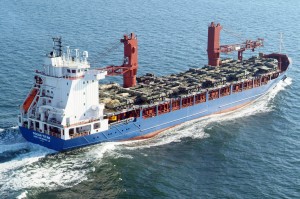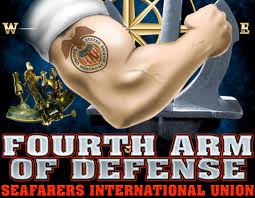Farm Bill amendment could devastate merchant marine capability, U.S. security

I’m a lot more confident in a 50-pound bag of food reaching its intended destination than I am a 50-pound bag of money being used as intended.
– Paraphrase of a U.S. Representative comment at recent gathering in Washington, D.C.
Washington – The defeat of the U.S. Farm Bill in its current iteration opens a potential for a new “poison pill” amendment that could devastate America’s merchant marine services.
It could replace the shipments of American agricultural products-the popular Food for Peace Progra- on American flag ships using American union seamen, with a paid-for-by-American-taxpayers cash voucher system that would give foreign governments money with little accountability, allowing them to use our money to purchase food or anything else, anywhere they wished.
While the amendment was narrowly defeated (220 To 203) in the House of Representatives, now that the overall Farm Bill has been defeated, the possibility exists that another poison pill amendment could be introduced into a new Farm Bill proposal.
‘FOOD FOR PEACE’
The current Food for Peace Program has three major functions:
• Helping to feed the world for more than 60 years, providing food to the world’s needy and poor.
• Boosting U.S. national security by ensuring American-flag ships are available with well-trained American mariners.
• Providing a market for American agricultural products to keep American farmers producing at peak performance to meet American and foreign needs.
To meet these goals, current law requires that:
• All federal funds be used for the purchase and delivery of food grown in the United States and,
• 50 percent of these commodities are transported by U.S.-flag commercial vessels with American crews. This contributes significantly to the commercial sealift capability needed by the Department of Defense to support America’s troops.
SEAFARERS POSITION

The Seafarers International Union (SIU) has joined with a broad coalition of businesses, civic and other groups through an organization called USA Maritime, to take oppose the amendment.
In a carrot-and-stick approach, the coalition has purchased advertising praising those representatives who opposed the Royce/Engel amendment and SIU President Mike Sacco has sent a blistering letter to every congressman who supported the amendment, pointing out the amendment “would have a devastating impact on the U.S. Merchant Marine.”
He pointed out that the amendment would have transformed “America’s premier foreign food aid program into a foreign cash giveaway program” that would “have resulted in a cavalier elimination of hundreds of middle class jobs…”
No Missouri congressmen received Sacco’s letter but three Illinois congressmen did: Bobby Rush (D-Chicago), Aaron Schock (R- Peoria) and Tammy Duckworth (D-Schaumburg).
Sacco urged all representatives to reconsider their position if and when the issue comes up again in a proposal to a new Farm Bill.
NATIONAL SECURITY AT STAKE
One of the most important issues that would have been a critical blow to America under the Royce/Engle amendment would be the crippling blow it would have on America’s merchant marine services, often called America’s Fourth Arm of Defense.
“Beyond the important contributions to our economy, a healthy maritime industry is vital to our national security,” said House Coast Guard and Maritime Transportation Subcommittee Chairman Rep. Duncan Hunter (R-Calif.)
“Throughout our history, the Navy has relied on U.S.-flag commercial vessels crewed by American Merchant Mariners to carry troops, weapons, and supplies to the battlefield.”
He pointed out that the merchant marine fleets have, “…Been a critical component of our country’s economic and national security from the founding days of the Republic…”
Since early in the previous decade, U.S. flag vessels have moved more than 90 percent of all the cargoes to Afghanistan and Iraq supporting U.S. and coalition forces.
JOBS AT STAKE
The Food for Peace program provides more than 44,000 jobs to American mariners and other U.S. workers while also spreading American goodwill and saving lives around the world.
According to an independent study, squashing the Food for Peace funding would result in 16,500 to 33,000 job losses throughout the U.S. economy. In all, the process of providing food aid employs 44,000 across the country and impacts the economies of 28 states.


Leave a Reply